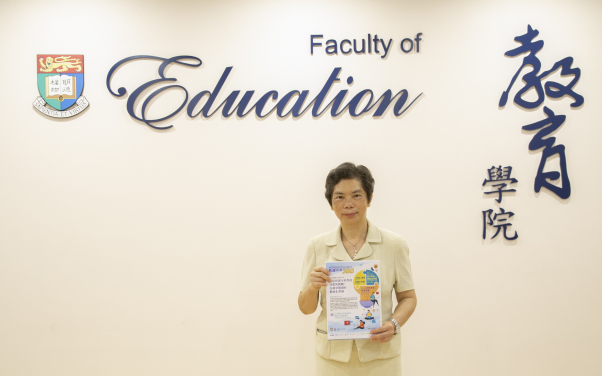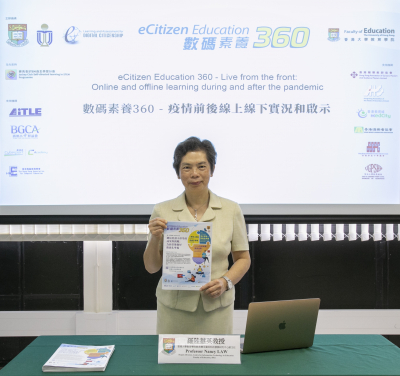Media
HKU study confirms pre-suspension e-learning preparedness and
family support critical for students’ online learning success,
calls for comprehensive measures to enhance online learning preparedness
20 Jul 2020
A research team led by Professor Nancy Law, Deputy Director of the Centre of Information Technology in Education, and Dr Tan Cheng Yong, Academic Unit of Social Contexts and Policies of Education (SCAPE) of the Faculty of Education, the University of Hong Kong (HKU), released the first of a series of six bulletins today (July 20) based on the data collected during school resumption from June to July 2020. The study is entitled “eCitizen Education 360”, which aims to collate the experience and needs of schools, teachers, students and parents in the transition to a full-fledged online learning experience during school suspension and their needs thereafter, with a view to taking joint school and community actions to shape quality learning and teaching to prepare for the new normal of many uncertainties. The survey was met with the enthusiastic support from over 1,200 teachers, 1,300 parents and 6,000 students from primary, secondary and special schools.
Key findings
Effort of schools and parents to sustain learning paid off:
- With the effort jointly made by schools and parents, learning was sustained throughout the school suspension period. School leaders, teachers, and a large majority of parents and students did not worry about the impact on students’ long-term academic attainment or chances in life despite prolonged school suspension.
- School leaders, parents, students, and especially teachers agreed that students gained more digital skills during this period.
The cumulative negative effects due to socioeconomic and digital divides on disadvantaged students need attention:
- Parents from lower socioeconomic status (SES) families perceived significantly less improvement of their children’s digital skills during the school suspension period. They also reported higher levels of inadequacy in access to large screen devices (9.89%) or digital learning resources (17.79%) for their children’s learning at home.
- Only 15% of parents reported lowered expectations of their children’s results in the upcoming examination while 30% actually reported an increased expectation. The change in expectation is positively correlated with home-based parental involvement. Parents from lower SES backgrounds reported lower levels of home-based involvement with their children’s education both before and during the school suspension periods and they lowered their expectation of the children’s academic attainment.
- Students from higher SES backgrounds were less worried about their academic studies and had better emotional wellness. They had higher confidence in their ability to learn both before and during the school suspension period.
Pre-suspension e-learning preparedness crucial to effective online learning transition:
- Students from schools that had given a higher priority to e-learning and had in place a more comprehensive e-learning implementation plan before the pandemic (e.g. those with a “Bring-Your-Own-Device” strategy) reported greater gains in digital skills and lower stress about school resumption.
- Teachers from these more e-learning ready schools were also more likely to share effective teaching strategies with each other, adopting more student-centred online pedagogy such as individual counselling and small group tutorials via videoconferencing.
Implications for actions from the research findings
- Schools should devise whole-school comprehensive plans incorporating adaptive and flexible online and offline learning and teaching arrangements by referencing and learning from the positive experiences gained before and during school suspension in schools across Hong Kong;
- There is an urgent need to provide technology access and other accompanying support for those students without adequate internet access and efficient devices for learning at home; and
- Partnership should be fostered between schools and community organisations to provide support to students and parents in need that is appropriate for their specific contexts.
Professor Nancy Law remarked: “The Advisory Committee members of the project applauded our realisation of the ambition to complete the surveys and publish the first bulletin in two months. I am truly proud of my team’s zeal and commitment to the research as well. The applause should also go to our teachers in the front line and the supporting organisations, including three primary and secondary schools’ heads associations, two computer educators associations, Hong Kong Association of Careers Masters and Guidance Masters, and HKEdCity. We are very pleased to see from the data collected from the participating schools that despite the many challenges in the uncharted terrain, online learning has brought significant improvements in digital competence of students and teachers, and without long term negative impacts on academic outcomes as perceived by all stakeholders, thanks to the efforts of school leaders, teachers and parents. In fact, those parents who have become more actively involved in their children’s learning actually expected their children to achieve higher examination results, as well as improved relationships with their children. The generous support from the wider Hong Kong community to provide material and service support to students and families has also contributed much to the success.”
Professor Catherine K.K. Chan, Academic Unit of SCAPE, Faculty of Education, HKU, said: “A key feature that distinguishes ‘eCitizen Education 360’ from other research projects is the focus on actions. We have partnered with a range of community organisations, such as Hong Kong Jockey Club, The Boys’ and Girls’ Clubs Association, Hong Kong Playgrounds Association, Cyberport, to name a few, to address the findings through actions – to make an actual impact on students’ learning with the help of digital technology. We believe that digital literacy plays a vital role in learning in the 21st century and we should equip our students with both the skills and the resources to help them attain their fullest potentials.”
Dr Tan Cheng Yong, an expert in familial and school factors on student learning, added: “We observed that students from lower SES backgrounds were distinctly disadvantaged in terms of learning opportunities when the only viable form of formal education during school suspension was online learning. Not only were these students often lacking a large-screen device with adequate internet connectivity, but also likely to have lower digital skills, a critical key to unlock the power of learning with technology, But we are also happy to see that schools with more advanced e-learning strategies before the pandemic could actually make a difference. This may sound obvious, but this research provided comprehensive data to confirm that students in schools with a holistic e-learning plan before COVID-19 were better prepared for the transition to online or blended modes of learning.”
About “eCitizen Education 360”
The prolonged period of fight against COVID-19 and school suspension has posed huge challenges to every member of the education community. The tremendous effort of schools in sustaining learning online has not only overcome limits presented by social distancing, but inspire a new chapter of educational transformation as schools resume. The project is a comprehensive 360-degree survey study with widespread support from academia, parents, professionals and community organisations. By gathering information about the experiences and needs of primary and secondary schools during the periods of school suspension and resumption, we aim to enhance our comprehensive capacities to act as a community to improve the education opportunities, digital competence and well-being of students. These would also enable them to cope with various aspects of life in the fast-changing world in which digital technology plays a pervasive role.
Please click here for the presentation slides shown at the media conference.
For more details of the “eCitizen Education 360” Project and the bulletin, please visit https://ecitizen.hk/360. To review the e-version of the press release, and download photos and presentation file and further reference materials, please visit http://web.edu.hku.hk/press.
For media enquiries, please contact Ms Emily Cheung, Senior Manager (Development and Communications), Faculty of Education, HKU (Tel: 3917 4270 / Email: emchy@hku.hk), or Ms Cherrie Yan, Project Manager, “eCitizen Education 360” Project, Faculty of Education, HKU (Tel: 5910 5633 / Email: dcitizen@hku.hk).


